To ensure we’re delivering on our commitment to meeting and exceeding your expectations, we will be consolidating our Woodstock, Virginia,; Martinsburg, West Virginia; and Charles Town, West Virginia offices into our Winchester, Virginia office effective June 1, 2024.
Don’t worry, though — the quality service and friendly staff will remain the same!
Starting a farm can be challenging, but securing a financial lender is a great first step in supporting your growth. The Grow Ahead loans are uniquely designed to support young and beginning farmers by providing financing and support to serve both full-time and part-time farming needs.
Whether you’re looking to increase your acreage or square footage today or a couple years down the road, we offer flexible land loan programs and financing options to suit your needs.
How to Get Land Loans for the Space You Desire
If you want to purchase bare land, we offer acreage loans and other land loan products with:
Newsroom
Annual Review: Enhancing Your Crop Insurance Strategy
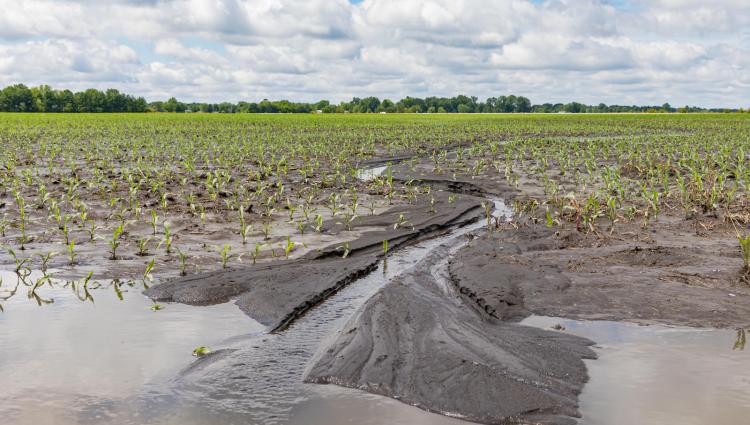
As the new year unfolds, crop insurance agents throughout our footprint are gearing up to engage in discussions with producers about policy and operational adjustments for their upcoming spring crops. Annually, the Risk Management Agency introduces vital programs in various regions, necessitating clear explanations to producers to help them make informed decisions on potential policy enhancements for their operations. Amidst the evolving landscape of crop insurance programs, any changes within your operation also demand attention.
During the sales closing season, your agent seeks to identify any deviations from the prior year, such as renting, purchasing, or selling land, alterations in entity type, or changes in entity members. It is imperative for your agent to ensure that your policy accurately reflects these changes each year, safeguarding against complications in the event of a claim.
While crop insurance policies automatically renew, providing continuity in coverage, they must adapt to the dynamic nature of agricultural operations. Given the fluctuating input costs, commodity prices, and production history, an annual assessment of your policy becomes paramount. Scheduling a meeting or call with your agent is the optimal way to explore the array of options that crop insurance offers, tailoring your coverage to align with the evolving needs of your operation.
A knowledgeable and experienced crop insurance agent is a critical component to your support network, and can play a crucial role in keeping you informed about updates in the crop insurance program, ensuring your strategy remains effective amidst the ever-changing agricultural landscape.
When you’re ready to review your policy, or learn more about how crop insurance can benefit you and your business, give us a call to speak with a member of our crop insurance team today at 888.339.3334 or click here to learn more.
Please enter a valid password to access this page:
Wrong password. Try again!Newsroom
Farmers on the Rise, Eric & Elizabeth Ziegler

Farm Credit awarded a total of $100,000 to beginning farmers through the Farmers on the Rise Award Program on December 7, 2023. Eric & Elizabeth Ziegler of Lebanon County, PA are one of ten recipients.
Eric and Elizabeth Ziegler are the co-owners of Royal Oaks Farm, a pick-your-own flower operation they founded in 2021. They've been managing the Smith-Ziegler Dairy, a 200-cow dairy since 2017 and are in the process of transitioning ownership from the previous generation.
The two farms are adjoining and complement each other well. Between the two, Elizabeth and Eric operate 147 total acres. They plan to grow both farming enterprises to maintain agricultural diversity and create opportunities for their children, both now and in the future. Their long-term goals are to continue working toward sole ownership of the dairy through the purchase of the remaining farm real estate, upgrading facilities, and making plant investments. They plan to purchase educational signage and establish an additional perennial field, which will allow for an expanded season.
You can meet all of the 2023 award winners here, and learn more about their farming experience on our blog!
Please enter a valid password to access this page:
Wrong password. Try again!Newsroom
Farmer on the Rise, Henry Spies V
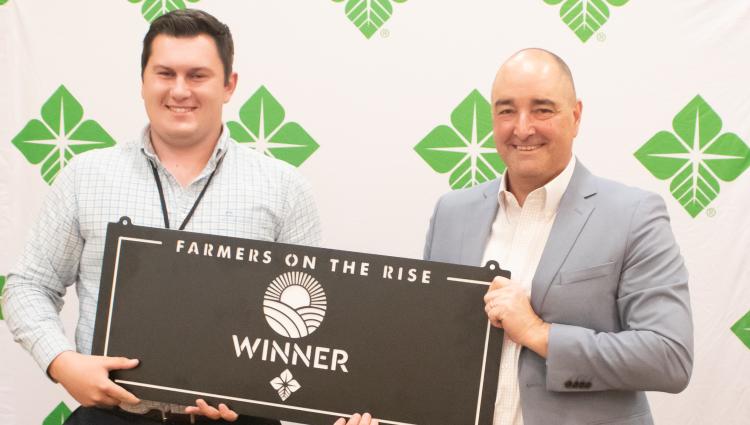
Farm Credit awarded a total of $100,000 to beginning farmers through the Farmers on the Rise Award Program on December 7, 2023. Henry Spies V of Caroline County, MD is one of ten recipients.
Henry operates Marsh Creek Cattle Company. He established the farm in 2019 in partnership with his younger brother; they are both beginning farmers. The operation currently spans 37 acres and raises pastured-based proteins: beef, pork, chicken, and eggs. They started with rotationally grazing beef calves in 2019 but then shifted toward hogs, chickens, and egg layers due to a quicker return-on-investment. They started with 250 layers in April of 2021, with a plan to offer home delivery of all proteins. Demand for eggs grew and Henry ultimately increased the flock to 800 hens.
Henry and his brother both farm full-time, with Henry managing delivery, farmers' market presence, and online sales. They plan to further increase the flock size and partner with other farms to provide beef, pork, and chicken to their online customers. To that end, the brothers have secured a lease on a larger parcel of land in Denton, Maryland. They plan to establish some basic infrastructure there, including the rebuilding of a high tunnel for winter housing of the hens. Additionally, they going to improve the structure that will contain their egg washing system; it needs water, electric, and insulation to allow for year-round washing and packing.
You can meet all of the 2023 award winners here, and learn more about their farming experience on our blog!
Please enter a valid password to access this page:
Wrong password. Try again!Newsroom
Farmer on the Rise, Duy Pham

Farm Credit awarded a total of $100,000 to beginning farmers through the Farmers on the Rise Award Program on December 7, 2023. Duy Pham of Somerset County, MD is one of ten recipients.
Duy is a first generation farmer. He owns and manages a poultry farm on 25 acres. He purchased his six house, 180,000 square foot operation in 2020 and grows broilers for Mountaire Farms. He is passionate about the wellbeing of his flock and all contributing factors from nutrition to housing and veterinary care to biosecurity. Prior to farming, Duy spent eight years as an electrician, three years as a welder, and was employed in the area of environmental enhancement practices for a large manufacturer - all of which have helped him to keep his poultry farm clean, safe, efficient, and environmentally friendly.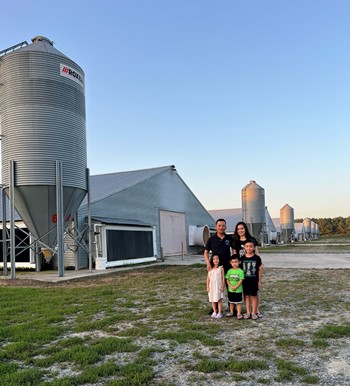
Duy is planning to upgrade the heating system in his poultry houses. Currently, he relies on tube heaters in his chicken houses, which have been in use for 18 years. Overtime, their efficiency has significantly decreased, resulting in wasteful fuel consumption and decreased performance. Upgrading this heating system will have an immediate and substantial impact on his farm's efficiency and overall success.
You can meet all of the 2023 award winners here, and learn more about their farming experience on our blog!
Please enter a valid password to access this page:
Wrong password. Try again!Newsroom
Farmer on the Rise, Julie Henninger
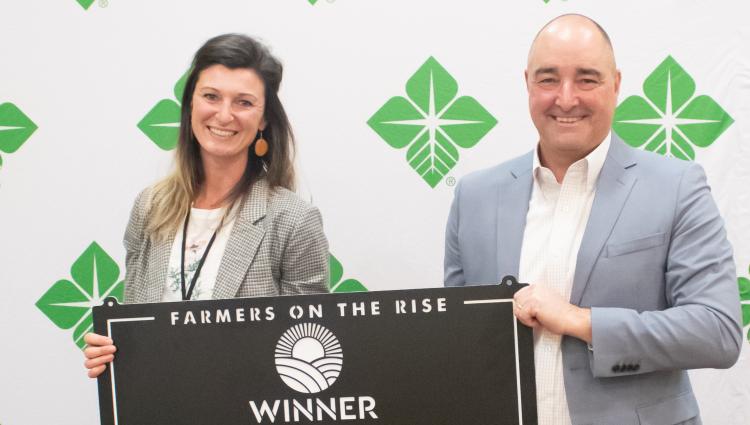
Farm Credit awarded a total of $100,000 to beginning farmers through the Farmers on the Rise Award Program on December 7, 2023. Julie Henninger of Cumberland County, PA is one of ten recipients.
Julie established Good Keeper Farm in 2014 and hasn't looked back. She started growing vegetables on one acre and is now growing in four high tunnels and one heated greenhouse, on a total of six acres. All of her produce is Certified Organic and Real Organic Project certified. Good Keeper Farm operates a CSA and is a year-round vendor at a downtown market in Carlisle. Additionally, the farm provides vegetables and eggs to ten wholesale customers on a weekly basis. 
To increase efficiency, Julie plans to purchase a tractor for the farm. She currently has shared access to an older tractor, but that arrangement does not provide the reliability or consistency needed for her operation. The implements Julie would like to use, such as a waterwheel transplanter or potato harvester, are not compatible with the shared tractor. A new tractor will mean fewer hours troubleshooting mechanical problems, more timely planting, cultivating and harvesting, and will speed up field preparation, leading to increased yields.
You can meet all of the 2023 award winners here, and learn more about their farming experience on our blog!
Please enter a valid password to access this page:
Wrong password. Try again!Newsroom
Farmers on the Rise, Richard & Jennifer Hartleib
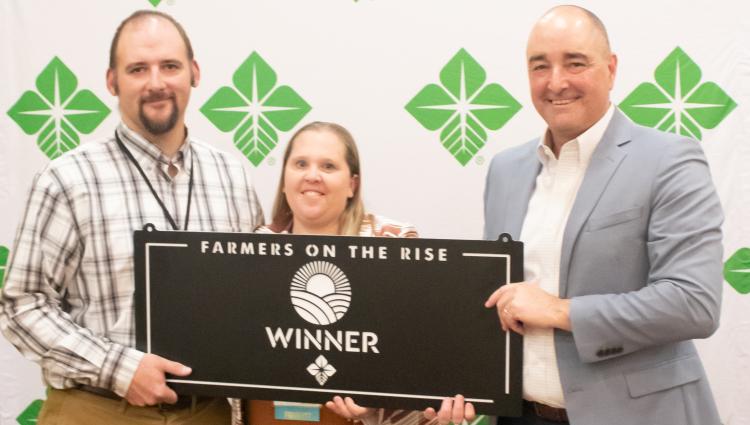
Farm Credit awarded a total of $100,000 to beginning farmers through the Farmers on the Rise Award Program on December 7, 2023. Richard & Jennifer Hartleib of Berks County, PA are one of ten recipients.
Richard and Jennifer founded Castenea Farms, LLC in 2018. They designed the operation within an agroforestry concept, integrating multiple crops on the same acreage. Their primary crop, chestnuts, is grown throughout their property.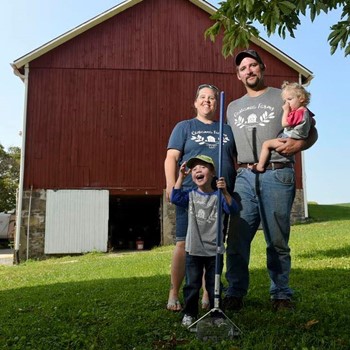 They rotationally graze hair sheep and cow calf belted Galloway pairs in pastures shared with the trees. The trees are grown to produce nuts in the future, get fertilized by the livestock, and the livestock benefit from the dappled shade provided by the trees. The Hartleibs grow fresh figs and early spring greens in a high tunnel and offer pick-your-own strawberries. They utilize a riparian area to grow woody florals (winterberry holly, curly willows, pussy willows). The plants not only provide a water quality benefit, they offer an early season pollen source for honeybees.
They rotationally graze hair sheep and cow calf belted Galloway pairs in pastures shared with the trees. The trees are grown to produce nuts in the future, get fertilized by the livestock, and the livestock benefit from the dappled shade provided by the trees. The Hartleibs grow fresh figs and early spring greens in a high tunnel and offer pick-your-own strawberries. They utilize a riparian area to grow woody florals (winterberry holly, curly willows, pussy willows). The plants not only provide a water quality benefit, they offer an early season pollen source for honeybees.
They recently acquired additional acreage for nut production and are planning to break ground on a storage barn to protect equipment, hay (made on site), and produce bins containing fresh product waiting for transport to market. Having this storage will significantly reduce unnecessary crop degradation and contribute to the longevity of their equipment.
You can meet all of the 2023 award winners here, and learn more about their farming experience on our blog!
Please enter a valid password to access this page:
Wrong password. Try again!Newsroom
Farmers on the Rise, Tyler & Katie Fraser
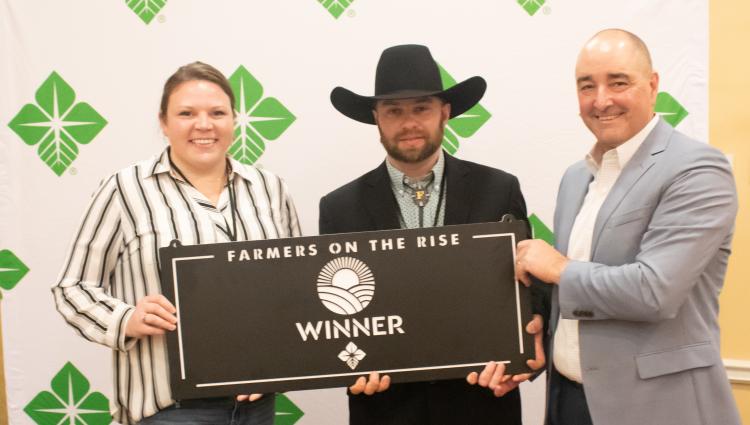
Farm Credit awarded a total of $100,000 to beginning farmers through the Farmers on the Rise Award Program on December 7, 2023. Tyler and Katie Fraser of Clarion County, PA are one of ten recipients.
Tyler and Katie are beginning farmers who own and operate Fraser Cattle Company, on just over 60 acres. They started with four cows, a bull, and a gilt in 2020. Over the past three years, they've expanded to a breeding herd of 19 Hereford cattle including cow/calves, yearling heifers and bulls, ten Angus-cross feeders, one bred crossbred sow, 13 feeder hogs, 30 laying hens, 42 broiler chickens, and a home garden.
Both Katie and Tyler have extensive farming experience. Katie has worked in beef and dairy operations, and currently works as a Program Technician for the USDA Farm Service Agency. Tyler has worked on large grain farms, a dairy farm, and is a heavy equipment operator. They are planning to construct a corral and a chute system for their cattle and purchase ewes to start a sheep flock. Additionally, they are hoping to winterize some existing shelters for the hogs and sheep.
You can meet all of the 2023 award winners here, and learn more about their farming experience on our blog!